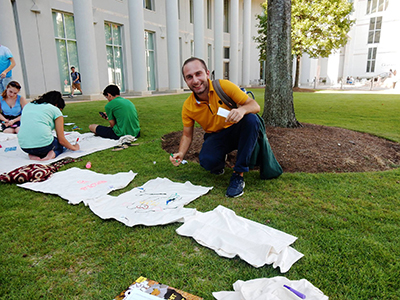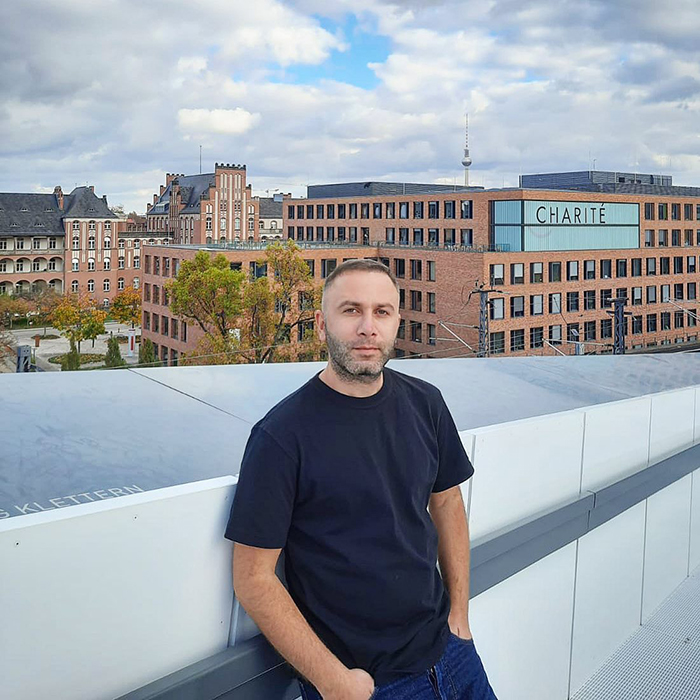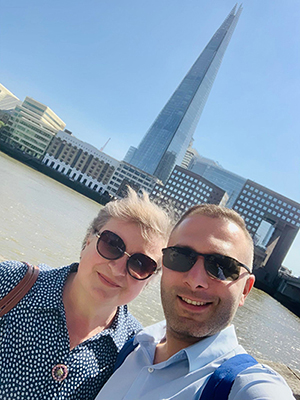 In the section “TSU Alumni”, we introduce Dimitri Chubinidze - one of the graduates of Tbilisi State University, who after graduation successfully continued his work in leading educational institutions abroad. Today, he is an Associate Researcher at the Institute of Psychology, Psychiatry and Neuroscience at King’s College London. But before that, he had a very interesting journey, which he tells us about himself.
In the section “TSU Alumni”, we introduce Dimitri Chubinidze - one of the graduates of Tbilisi State University, who after graduation successfully continued his work in leading educational institutions abroad. Today, he is an Associate Researcher at the Institute of Psychology, Psychiatry and Neuroscience at King’s College London. But before that, he had a very interesting journey, which he tells us about himself.
I enrolled at Tbilisi State University to study in the Master’s Program in Psychological Anthropology. I received my bachelor’s degree in journalism from David Aghmashenebeli University of Georgia. A large part of the undergraduate curriculum in journalism was devoted to the subjects of the general education module, which exposed me to many different areas. By the time I finished my bachelor’s degree, I felt that I did not have enough experience to be successful in the specific field of journalism, and at the same time, I was also interested in several other broad fields, such as psychology, anthropology, linguistics, and biology. In the fourth year of my bachelor’s degree, I started attending lectures of the BA program in Psychology at TSU, which at that time was at the Faculty of Social and Political Sciences; I attended the lectures given by professors Lali Surmanidze and Vakhtang Nadareishvili. Fascinated by these lectures, I chose the interdisciplinary field, hoping to gather common interests in one context. My choice was justified, I met interesting researchers, academic staff of the program from almost all faculties of TSU.
I continued my doctoral studies in the same direction, psychological anthropology, which I finished in 2018, with the doctoral research “Georgian Proverbs and Cultural Models of Adaptive Behavior” (supervisors: Prof. L. Surmanidze, Prof. V. Nadareishvili).
Proverbs as models of adaptive behavior
The dissertation is about the adaptive resource of Georgian culture, the ways (schemes) of problem solving, which are given to the members of the culture in a ready form. In simple terms, the understanding of culture and the context on which this research is based is as follows: a group of people has a common experience accumulated during the coexistence of these people and their ancestors. They faced innovations, challenges, problems and used different strategies to solve them. Over time, well-tested strategies emerge and become fixed as the ideal pattern of behavior. According to problem-solving strategies, this fixed experience is eclectic. Perhaps because contexts change and so do the strategies. However, this adaptive arsenal exists and is activated to help you when you need it. For example, if you find yourself in an intractable problem situation, one may call for appeasement, while others may tell you that where force fails, skill and patience will prevail. I was interested not only in researching Georgian cultural content, but also in mental representations of this cultural content, in other words - how cultural content is represented in the psyche of a modern Georgian.
According to research, two main orientations emerge when solving a problem situation: to stay with the problem situation or to avoid it. In the first case, three strategies are relevant: 1. Self-change - the behavioral subject tries to change himself with maximum use of active efforts and resources and adapt to the problem; 2. Passive expectation of change - the behavioral subject adapts to the problem situation by recognizing predetermination and passive orientation/waiting for the future change; 3. Strategic flexibility - the behavioral subject can be both active and passive, inwardly oriented; acts strategically, depending on the goals.
situation or to avoid it. In the first case, three strategies are relevant: 1. Self-change - the behavioral subject tries to change himself with maximum use of active efforts and resources and adapt to the problem; 2. Passive expectation of change - the behavioral subject adapts to the problem situation by recognizing predetermination and passive orientation/waiting for the future change; 3. Strategic flexibility - the behavioral subject can be both active and passive, inwardly oriented; acts strategically, depending on the goals.
In the case of avoiding a problem situation, the following strategy is relevant - search for a new environment.
Of course, we cannot determine the behavior of a specific person on the basis of these data, but we can assume what cultural content, tendencies may be relevant in solving the problem. For example, even a cursory look at modern Georgian political discourse will reveal these orientations.
Pampered by mentors
I acquired basic knowledge and research skills at the TSU Faculty of Psychology and Educational Sciences. I was pampered by mentors. When I enrolled in the master’s program, there were only two of us. I remember that very often the lectures were held individually. Under such conditions, even an unmotivated person could easily master a completely new profession. Therefore, first of all, I am grateful to my teachers and fellow students - the relationship with them made this process even more pleasant, we are still friends.
TSU differs from other Georgian universities mainly by its diverse profile of teaching and research, which really deserves attention, especially those branches that may not be in great demand by students, but their maintenance is necessary in terms of scientific and sustainable development.
I have had contacts with universities in the U.S. and the UK. Perhaps the biggest difference is the socio-economic and cultural area, which affects almost everything: professional relationships, work style, choices and priorities, decision making, motivation, etc.
During my PhD studies at TSU, I had educational and research visits to Emory University (Atlanta, USA) and the University of California (San Diego, USA). These visits helped me a lot in the process of working on my dissertation and in my professional development. Both universities have a long tradition of teaching and research in psychological and medical anthropology. I had the opportunity to consult directly with the author of the theory, whose theoretical model I used in my dissertation. These visits were made possible by funding from the Shota Rustaveli National Science Foundation and Emory University.
After defending my thesis, I did postdoctoral research at University College London, funded by the European Research Council and the National Science Foundation.
I remember all the visits very well. However, the time spent at Emory University is truly unforgettable. First, it is due to the merits of Prof. Bradd Shore who served as my dissertation advisor. He made a special contribution to the convergence of the anthropological and psychological fields and to the creation of the theoretical foundations of psychological anthropology. Outside of his scientific work, he created opportunities for deep and meaningful relationships because he has a natural interest in people and other cultures. However, this is not just an interest for knowledge, it is a way of being and a source of joy for him.
Look in neighboring auditoriums as well
 It is difficult to give advice about the profession. Interdisciplinary fields are interesting in terms of content, but you have to constantly build your own professional identity. In the process, you create your own research profile and acquire relevant competencies. But it is not always easy to communicate about this with 'others'. In the Georgian academic space, very clear boundaries are often drawn between branches and fields. In fact, these boundaries are fragile. This creates obstacles for people with qualifications in interdisciplinary fields as well as for interdisciplinary research activities. For example, I personally have had to define my profession and justify my qualifications on several occasions. Of course, this is not unexpected when you have two big umbrella disciplines in your name - psychology and anthropology. However, in other countries where there is an organic culture of interdisciplinary work, such obstacles are rare. Therefore, people who are particularly anxious about uncertainty may find studying in this type of program challenging. At the same time, for those who love challenges, interdisciplinary programs stimulate creative processes.
It is difficult to give advice about the profession. Interdisciplinary fields are interesting in terms of content, but you have to constantly build your own professional identity. In the process, you create your own research profile and acquire relevant competencies. But it is not always easy to communicate about this with 'others'. In the Georgian academic space, very clear boundaries are often drawn between branches and fields. In fact, these boundaries are fragile. This creates obstacles for people with qualifications in interdisciplinary fields as well as for interdisciplinary research activities. For example, I personally have had to define my profession and justify my qualifications on several occasions. Of course, this is not unexpected when you have two big umbrella disciplines in your name - psychology and anthropology. However, in other countries where there is an organic culture of interdisciplinary work, such obstacles are rare. Therefore, people who are particularly anxious about uncertainty may find studying in this type of program challenging. At the same time, for those who love challenges, interdisciplinary programs stimulate creative processes.
First of all, I wish them success, I wish them not to be afraid of novelties and obstacles, to look in neighboring auditoriums, if they have the opportunity, to travel and study in other universities. This is the best way to gain knowledge and experience. At the beginning, everything may not be as attractive as we imagine before becoming a student, but with work, any field becomes an interesting and pleasant experience. I would like students to have more opportunities to integrate into the Western educational and scientific space and the university, along with all other goods, to create the conditions for this. Learning is, first of all, noticing differences, transforming them into novelties, and, as a result, acquiring knowledge. That is why I think it is important for a successful university education to be interested in and respectful of diversity and to strive for innovation.
About the present and the future
I am currently working at King’s College London. I like this job; I learn a lot from colleagues and students. I especially like the fact that I am involved in research activities with an interdisciplinary profile. Our research group investigates the practice of clinical psychology and psychiatry, which we develop in collaboration with the field of health technology. This process is particularly interesting because it gives me the opportunity to test myself in different methodological and theoretical contexts. The pleasant part of this work is that my supervisor is a UK-based Georgian scientist, Prof. Keti Chanturia. Working with Keti is a great honor, both professionally and personally. We used to think about Georgia together. This is a great relief when you are in emigration.
especially like the fact that I am involved in research activities with an interdisciplinary profile. Our research group investigates the practice of clinical psychology and psychiatry, which we develop in collaboration with the field of health technology. This process is particularly interesting because it gives me the opportunity to test myself in different methodological and theoretical contexts. The pleasant part of this work is that my supervisor is a UK-based Georgian scientist, Prof. Keti Chanturia. Working with Keti is a great honor, both professionally and personally. We used to think about Georgia together. This is a great relief when you are in emigration.
The Faculty of Psychology and Educational Sciences at TSU is very special to me. I have spent almost 12 years here. First, I studied, then I worked as a lecturer and headed the scientific service of the faculty. During this time, I met many valuable people. As for the official cooperation, I am currently involved in the doctoral program “Cultural Personology, Psychological Anthropology and Migration Studies.”
I will add one thing. In Georgian society (excuse me for this degree of generalization), there is a big difference between scientific psychological knowledge and the so-called 'folk' views. For example, the so-called psychological knowledge about ‘norma-pathology’ is based on a huge scientific research activity and achievements, which are up-to-date and known to field specialists. However, a large part of society does not have access to this knowledge, which creates many difficulties, such as the possibility of stigmatization and bullying, as well as the deplorable situation in the field of mental health. The involvement of psychologists and educational specialists is essentially limited to teaching or therapy. However, in the Georgian context, these professions can play a much larger role. I believe that these functions cannot be performed only in an auditorium or a clinical office. Challenging deeply held beliefs and active civic engagement are important. This path is difficult, because at this time specialists have to confront narrow local superstitions, which, along with knowledge, requires overcoming endless contradictions. Therefore, I have special respect for those people who are actively engaged in civic activism today, and I am very happy to see familiar faces among them. I sincerely hope that this commitment will continue to grow. When I say this, I also mean myself. Otherwise, I think it will be impossible to overcome the scientific-cultural dissonance, the reflections of which we encounter at every step of public life in Georgia. Without the active participation of psychologists and teachers, the development, change, and even the implementation of such an undoubted and constitutionally declared goal as European integration will be significantly hindered. The university has a special responsibility on this path.

 FACULTY OF EXACT AND NATURAL SCIENCES
FACULTY OF EXACT AND NATURAL SCIENCES
 FACULTY OF HUMANITIES
FACULTY OF HUMANITIES
 FACULTY OF SOCIAL AND POLITICAL SCIENCES
FACULTY OF SOCIAL AND POLITICAL SCIENCES
 FACULTY OF PSYCHOLOGY AND EDUCATIONAL SCIENCES
FACULTY OF PSYCHOLOGY AND EDUCATIONAL SCIENCES
 FACULTY OF ECONOMICS AND BUSINESS
FACULTY OF ECONOMICS AND BUSINESS
 FACULTY OF MEDICINE
FACULTY OF MEDICINE
 FACULTY OF LAW
FACULTY OF LAW



